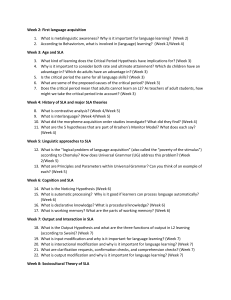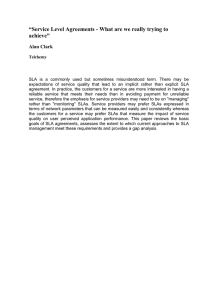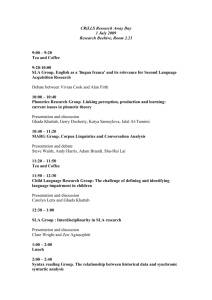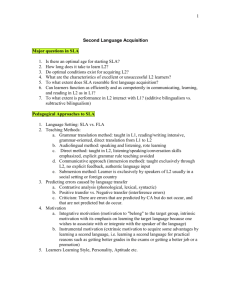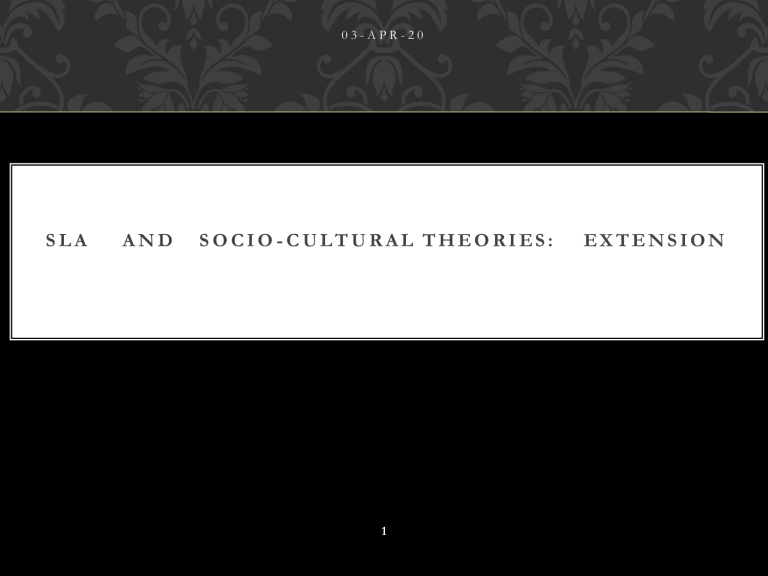
03-APR-20 SLA AND SOCIO -CULTURAL THEORIES: 1 EXTENSION 03-APR-20 INTRODUCTION How would you define these concepts: Culture? Community? Identity? 2 03-APR-20 CULTURE 3 03-APR-20 CULTURE • the beliefs, customs, arts, etc., of a particular society, group, place, or time • a particular society that has its own beliefs, ways of life, art, etc.. • a way of thinking, behaving, or working that exists in a place or organization (such as a business). 4 03-APR-20 CULTURE …the “glue” that binds a group of people together. …different underlying values, attitudes, and beliefs about what is considered “good” behavior and action. Software of the mind. 5 Finkbeiner, 2008, p.p. 131-132 03-APR-20 COMMUNITY 6 03-APR-20 COMMUNITY • a group of people who live in the same area (such as a city, town, or neighborhood) • a group of people who have the same interests, religion, race, etc. • a group of nations (i.e.: the European Community). 7 03-APR-20 IDENTITY 8 03-APR-20 IDENTITY • who someone is. • the qualities, beliefs, etc., that make a particular person different from others 9 03-APR-20 SOCIOCULTURAL THEORY AND SLA 10 03-APR-20 SOCIOCULTURAL THEORY AND SLA General characteristics: • It draws on Vygotsky and Bakhtin. • Places greater importance on interaction, not from a psycholinguistic perspective, but from a social perspective. • Focuses on the importance of context, understood as the interplay of cultural influences and meaning derived from groups 11 03-APR-20 SOCIOCULTURAL THEORY AND SLA Vygotsky Bakhtin Social nature of learning Social nature of language Sociocultural view of SLA 12 03-APR-20 SOCIOCULTURAL THEORY AND SLA Definitions of learning: A process “whereby more experienced participants in a culture bring the ‘intellectual tools of society’ […] within the reach of less experienced members.” Norton adn Toohey, 2001 13 03-APR-20 SOCIOCULTURAL THEORY AND SLA Definitions of learning: Learning is socially situated and it involves increasing participation in communities of practice… Mitchell and Myles, 2004 14 03-APR-20 SOCIOCULTURAL THEORY AND SLA Definitions of learning: …the social processes that support learner’s appropriation of the kind of cultural repertoire that make membership into a group possible. Ortega, 2009 15 03-APR-20 COMMUNITIES OF PRACTICE An aggregate of people who come together around mutual engagement in an endeavor […] it is defined by its membership and by the practice in which the membership engages. Eckhert and McConnell-Ginet, cited by Mitchell and Myles, 2004, p. 241. 16 IDENTITY THEORY IN SLA 03-APR-20 Western culture Latin-America Colombia Cali Neighborhood 17 IDENTITY THEORY IN SLA 03-APR-20 18 IDENTITY THEORY IN SLA 03-APR-20 19 IDENTITY THEORY IN SLA 03-APR-20 Decisions to accept or reject an assigned position Agency Activities (or lack thereof) to get access Identity Use of “social” capital. Investment Engagement to create access to the networks within the community 20 HOW DOES ALL THAT ADD UP 03-APR-20 From this perspective, learners of English participate in particular, local contexts in which specific practices create possibilities for them to learn English. NortonandToohey, 2001,p. 311 21 03-APR-20 How does all that add up L2 learning is not seen… asa gradual and neutral process of internalizing the rules, structures, and vocabulary of a standard language; rather, learners are seen to appropriate the utterances of others in particular historical and cultural practices, situated in particular communities. Thus, researchers need to pay close attention to how communities and their practices are structured in order to examine how this structuring facilitates or constrains learners’ access to the linguistic resources of their communities. Norton and Toohey, 2001, p. 312 22 IMPLICATIONS 03-APR-20 • A better understanding of power relations, social inequities, political influences and cultural stereotyping as related to SLA. • A reconceptualization of the “GLL” (those who exert agency and decide to invest). 23 IMPLICATIONS 03-APR-20 • A framework for the study, design and implementation of technology-mediated language teaching. • Integration of the view of “language as ideology”. 24 limitations 03-APR-20 • A great deal of research in sociocultural theory has been carried out in SL contexts (immigrants, international students, etc.) • Little evidence of the concepts in FL contexts were access to participation might be influence by different environmental effects. • Criticism on the qualitative and relative nature of the studies as opposed to the traditional, positivistic 25 03-APR-20 STAY SAFE 26
